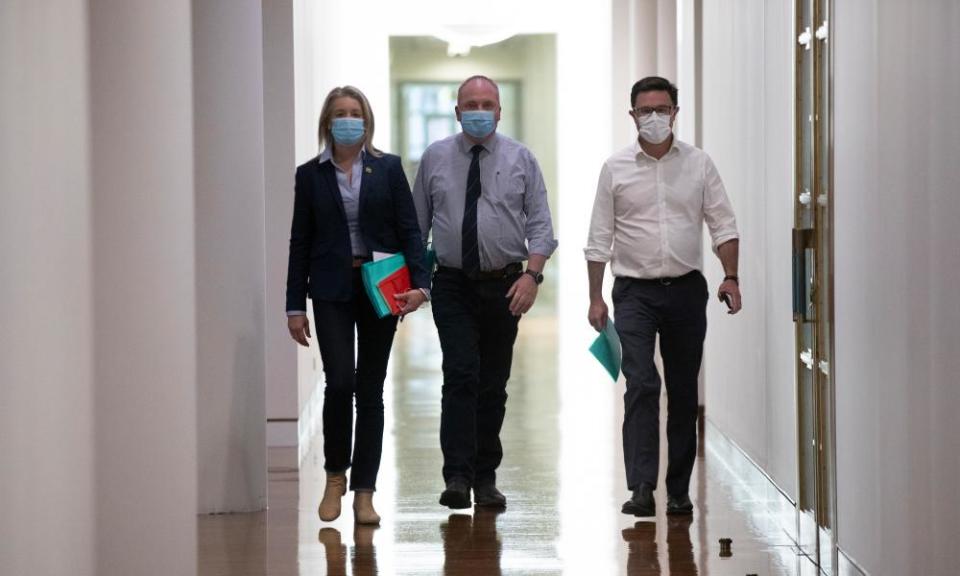‘A long way to play out’: Nationals fail to reach agreement on 2050 emissions reductions

The National party has exited a marathon meeting where they discussed the Morrison government’s climate policy without coming to an agreement – with discussions to continue into the parliamentary sitting week.
The not-unexpected outcome came after more than four hours of talks on Sunday. The Liberal energy minister, Angus Taylor, spent the first three hours briefing the party room on a proposal to commit Australia to a net zero emissions target by 2050 and the roadmap to get there.
The Nationals left the room without agreeing to the plan but they didn’t say no either.
The proposal put forward by Taylor remains confidential making Nationals MPs reluctant to comment. But some said they left the room still uncertain of the detail.
Related: The Nationals won’t support a much tougher 2030 emissions target, Barnaby Joyce says
“This has a long way to play out before an agreement is even close to being reached, I think,” one told Guardian Australia.
The deputy Nationals leader, David Littleproud, walked out of the meeting and into the Sky News studio saying there were more questions to be answered. “We are going to take our time to get it right,” he said.
Littleproud was cautiously optimistic the party room would come on board, eventually.
“To be respectful to Angus it’s a technology roadmap and the plan is one he has put together and obviously at some point, they will become public,” he said.
“But from our perspective, we have already done much of the work. We are already on a trajectory of meeting much of our [national] commitments through technology.
“While they might say it’s a three-word slogan [technology not taxes] it actually has some currency around the work that’s being done with carbon capture storage and what could happen with hydrogen. But the reality is we’re still going to see coal being mined for some time to come and anyone realistic will see that.”
Taylor released a statement following his presentation, calling the discussion “constructive and collegiate” while focussing on jobs.
“There was a strong joint commitment to policies that strengthen our regions, not weaken them,” the minister said. “It was also clear that there was absolutely no appetite for policies that impact jobs or add to the cost of living through an explicit carbon tax or a sneaky carbon tax. Which we won’t be doing.”
Littleproud attempted to reassure a core LNP constituency they were not at risk.
“If you’re a coalminer in central Queensland you shouldn’t be shuddering in your boots tonight, you’re still going to have a job, we’re going to see those jobs and coal exports go well into the 2040s, probably into the 2050s,” he said.
“This is more about what does it look like in 30 years’ time. We’ve been asked to come up with a plan that far out and the technologies we’re embracing and the investments we’re making and already funded mean that gives us a fair understanding of their trajectory. But there are still more questions – particularly what that looks like in 30 years’ time for regional Australia.”
Heading into the meeting, the Nationals leader Barnaby Joyce all but ruled out any changes to Australia’s medium term target of a 26%-28% reduction in emissions by 2030, something Australia is facing increasing pressure to change both domestically and internationally. The prime minister, Scott Morrison, has also told colleagues he wants to increase the existing 2030 target.
“I think that is highly unlikely,” Joyce said on Sunday when asked if the interim target could be doubled. A 2050 net zero decision was up to the party, Joyce said.
But there is almost no chance of the entire party room backing the move, particularly when it comes to Queensland members, who have been the most vocal in their opposition.
One of the biggest critics, Queensland LNP senator Matt Canavan, said it was unlikely he could be convinced.
“From what I’ve seen, the government doesn’t seem to have an answer,” he said.
“It has a prayer that hydrogen will somehow just work out, save all our jobs. The prime minister might believe in miracles but I don’t think we should be gambling people’s jobs on a prayer.”
Littleproud said it would have been “reckless” to come to any sort of agreement just hours after first seeing the government’s proposed plan.
Parliament meets for the first time in six weeks on Monday with the policy to be discussed in cabinet before the Liberals and Nationals jointly meet for the first time since September on Tuesday.
The sitting fortnight will be used to try and come to an agreement before Morrison heads to Glasgow for the Cop26 UN climate conference at the end of the month.
Labor has seized on the indecision as a chance to point out more splits within the Coalition, with the opposition leader, Anthony Albanese, saying Australia’s climate policy was once again being held hostage by a minority.
“This is such an act of self-indulgence, to have National party ministers, including the deputy prime minister, acting as if they’re not part of the Coalition government,” he said.
“What we want to see is a legislated target. Unless it’s legislated they’re not being fair dinkum. And when Scott Morrison goes to Glasgow, Barnaby Joyce will be acting prime minister of this country, someone who has been a climate change skeptic, someone who has been a wrecker, and now they’re wrecking their own government.”

 Yahoo Movies
Yahoo Movies 